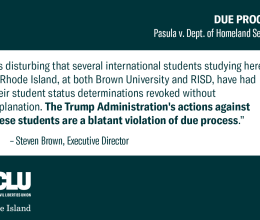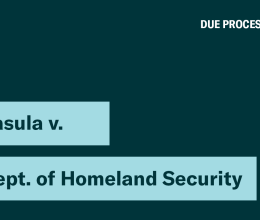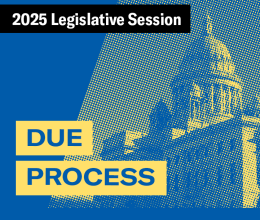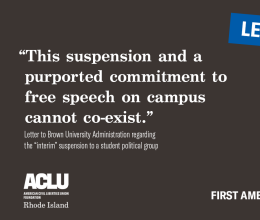The American Civil Liberties Union of Rhode Island (ACLU) and the National Center for Law and Economic Justice (NCLEJ) today announced that a settlement agreement has been signed with the state in the federal lawsuit the groups filed in December over the widespread failure of the state Department of Human Services (DHS) to timely provide SNAP food stamp benefits to needy families due to its troubled UHIP computer system. The settlement was reached with the assistance of U.S. District Court Chief Judge William Smith and is subject to the Court’s approval.
When the suit was filed in December, the ACLU and NCLEJ argued that the “systematically inadequate and faulty statewide implementation” of UHIP was causing “thousands of households to suffer the imminent risk of ongoing hunger as a result of being denied desperately needed assistance to help them feed their families.” The two named plaintiffs, representative of thousands of others, faced multiple delays in getting their food stamps.
The terms of the detailed 14-page settlement agreement include the following:
The state acknowledges its federal obligations to provide SNAP benefits in a timely manner, which means processing regular food stamp applications within thirty days of the date of application, and providing expedited food stamps to destitute households within seven days.
Deadlines are established for the state to meet the goal of processing applications in a timely manner. Starting with the month of April, the state must have an 80% timely processing rate for 7-day expedited applications and a 75% rate for 30-day regular applications. Those requirements increase each month until they must reach a 96% compliance rate for both types of applications by August.
The agreement codifies an existing informal process allowing plaintiffs’ counsel to refer individual cases of non-compliance to the state. In those instances, the state must review and respond to expedited applications by the close of the next business day, and within three days for other applications.
Within 30 days of court approval of the settlement, the state will be required to notify every person who has applied for SNAP benefits since August 2016 of the opportunity to seek retroactive benefits if DHS lost or did not timely process their prior application for benefits.
In addition to individualized notifications, the state will be required to post information about this process online and notify social service and other agencies about it.
The state will be required to submit detailed reports to plaintiffs’ counsel documenting that it is meeting the goals set for increased compliance with the federal reporting requirements.
In order to insure the compliance rate continues to be met, the court will retain jurisdiction of the case for at least one year after the state first achieves the 96% compliance rate.
The plaintiffs’ counsel will be entitled to their reasonable attorneys’ fees and costs.
The informal process for addressing complaints that was set up as a result of the lawsuit, and that is now codified in the settlement agreement, helped accelerate the resolution of numerous problems brought to the attention of the ACLU and NCLEJ. The ACLU itself received over 100 complaints after setting up a hotline last month to expedite applications for some of the people facing hardships getting their SNAP benefits due to UHIP problems.
While this settlement addresses only one program with systemic flaws resulting from the UHIP rollout, plaintiffs’ attorneys consider today’s settlement agreement an important step in righting the program and ensuring that the state fulfills its obligations under federal law. Implementation problems will likely remain for some time, however. Applicants for such programs as Medicaid and HealthSource RI also continue to face long delays due to UHIP, but those problems fall outside of this particular lawsuit.
The NCLEJ, co-counsel in the suit with the ACLU, is a national organization that promotes economic justice for low-income families.
Comments from participants in the lawsuit appear below.
NCLEJ attorney Greg Bass: “The settlement of this litigation should help provide critical relief for low-income families who desperately need food stamps to be issued in a prompt, efficient manner in accordance with federal law, in order to help put food on the table.”
ACLU of RI volunteer attorney Lynette Labinger: “We are pleased that we have been able to work out an agreement which establishes long-term and short-term requirements to address the systemic problems created by the UHIP program for SNAP applicants and which has the force of a federal court order behind it. However, congratulations are not yet in order. It remains for the State to meet those obligations. We have no doubt of the State’s good intentions and its determination to achieve the mandated benchmarks, but promises do not fill stomachs. If the State is unable to meet the standards that it has agreed to, this settlement establishes our right to return to Court to seek remedial relief for all SNAP applicants.”
ACLU of RI executive director Steven Brown: “This settlement agreement is a major step in addressing the fallout from the UHIP fiasco. We are hopeful that as the state works to correct the UHIP system to deal with SNAP applicants in accordance with the settlement agreement, it will have a positive impact on other UHIP programs as well. In the meantime, we will continue to examine the complaints we receive about these other programs in case additional action is necessary.”






